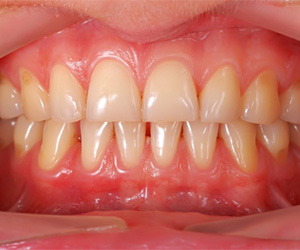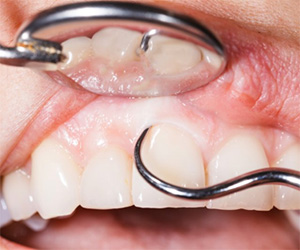








Gum disease is actually one of the most common diseases in the United States. It’s estimated that around 75 percent of Americans have some form of gum disease. Furthermore, nearly half of American adults have some form of periodontitis, which is the more harmful and damaging stage of gum disease. Without treatment, this infection can cause permanent damage in gum and bone tissue that inevitably leads to tooth loss.
Fortunately, scaling and root planing has been proven to be effective for those afflicted with gum disease. If you’re experiencing symptoms and don’t know where to turn, Dr. Megan McInnis is the person to see. When you contact her office, you can get regular maintenance performed and get your oral health back on track!

Routine cleanings (as well as at-home care) prevent gum disease for the most part, but scaling and root planing take it a step further. After thoroughly examining your mouth and numbing your gum tissue to make your treatment more comfortable, Dr. McInnis will start your gum therapy with scaling. To do this, she utilizes an ultrasonic scaling device to break apart plaque and tartar from the surface of teeth. Then, she uses a manual dental tool designed to scrape away any remaining plaque.
After scaling back all plaque from teeth, she’ll begin the root planing process. This is much like scaling of the tooth except it targets enamel hidden behind gum tissue. By scaling the root surface and smoothing out these rough areas, she can eliminate bacteria-containing biofilm and decrease gum inflammation.
Learn More about Scaling and Root Planing

It’s likely that you’ll need to have multiple periodontal treatments performed before your gums can begin to properly reattach to your teeth. On average, gum therapy like this can take between two and four visits to complete. If you require further surgery to treat your infection, scaling and root planing will be performed beforehand.
While follow-up appointments will be necessary to help your gums heal, you’ll also need to make improvements to your oral hygiene in between these appointments. After all, much if your oral health is managed in between dental visits. To keep your gums in good condition, make sure to:
You may also want to include a fluoridated mouth rinse that works to remove additional plaque from hard-to-reach areas of teeth. If your gums feel sensitive while practicing daily oral care, Dr. McInnis may recommend a desensitizing paste to make performing your care more comfortable.
Don’t wait to get your gum disease handled; your permanent teeth and systemic health are at stake! Contact our office to meet Dr. McInnis and receive treatment!